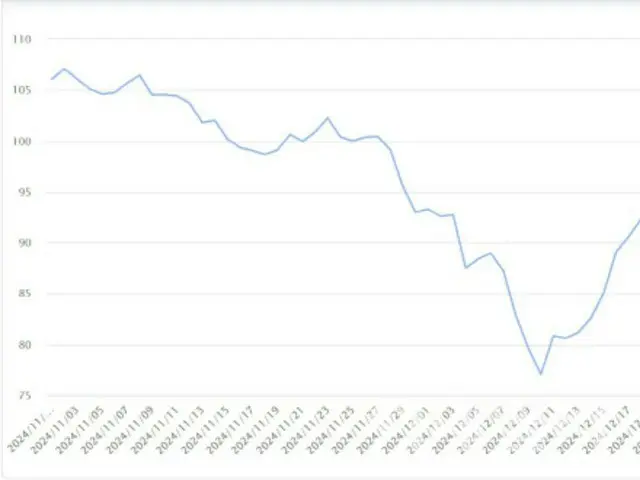Credit card spending is also showing signs of recovery, with some interpreting this as a sign that sluggish consumer sentiment has hit bottom.
According to the Bank of Korea, the News Index is a tool to measure the economic sentiment of the nation through news.
The National Sentiment Index (NSI) recorded 101.21 on the 7th, exceeding the long-term average of 100 for the first time since November 27th of last year. The latest data, the index on the 12th, also exceeded 100.
The NSI was created by the Bank of Korea by extracting 10,000 economic articles from about 50 domestic media outlets every day, and classifying them into positive, negative, and neutral sentiments using artificial intelligence (AI).
The index is calculated by calculating the difference in the number of sentences between the two. With 100 as the benchmark, if the index is above this number, it indicates a more optimistic sentiment than the past average (2005 to 2024), and if it is below this number, it indicates a pessimistic sentiment.
Although the NSI is not an official statistic from the Bank of Korea, it has been confirmed that it precedes major official statistics that show consumer and business sentiment. It is a prompt response to current events and a daily sentiment index.
The Bank of Korea explained that while one advantage of the index is that it allows investors to see the trends, it is important to take into account that the index is compiled on a daily basis and therefore is subject to large fluctuations depending on the situation at the time.
A Bank of Korea official explained, "The expectation that tariff policies will be eased somewhat under the new Trump administration and the South Korean government's announcement of special public holidays during the Lunar New Year period had a positive impact."
- The stabilization of the system in which Choi Sang-mok serves as Deputy Prime Minister and Minister of Strategy and Finance and the elimination of the "risk of impeachment" are also believed to have helped improve sentiment.
Actual data on private consumption also shows positive figures. According to Statistics Korea’s real-time consumption index, Nowcast, the credit card
The amount of spending on credit cards was down 3.1% in the second week of December compared to the same period last year, but the decline narrowed to minus 1.5% in the final week of December.
NH Investment & Securities researcher Jung Yeok-yeong said, "Political risks and other factors are causing soft data, such as consumer sentiment indicators, to fluctuate.
"Although the number of card purchases has fallen sharply, the hard data on card spending has recovered to a good level," he said. "Actual consumption is holding up better than we feared, and sentiment is likely to improve."
"The 27th was designated as an emergency public holiday, but the decision was made so close to the long weekend, and the recent airplane accidents and other factors have led to a rise in domestic demand rather than overseas travel," he said.
It looks like it could work in a beneficial way," he added.
2025/01/15 07:02 KST
Copyrights(C) Edaily wowkorea.jp 107

